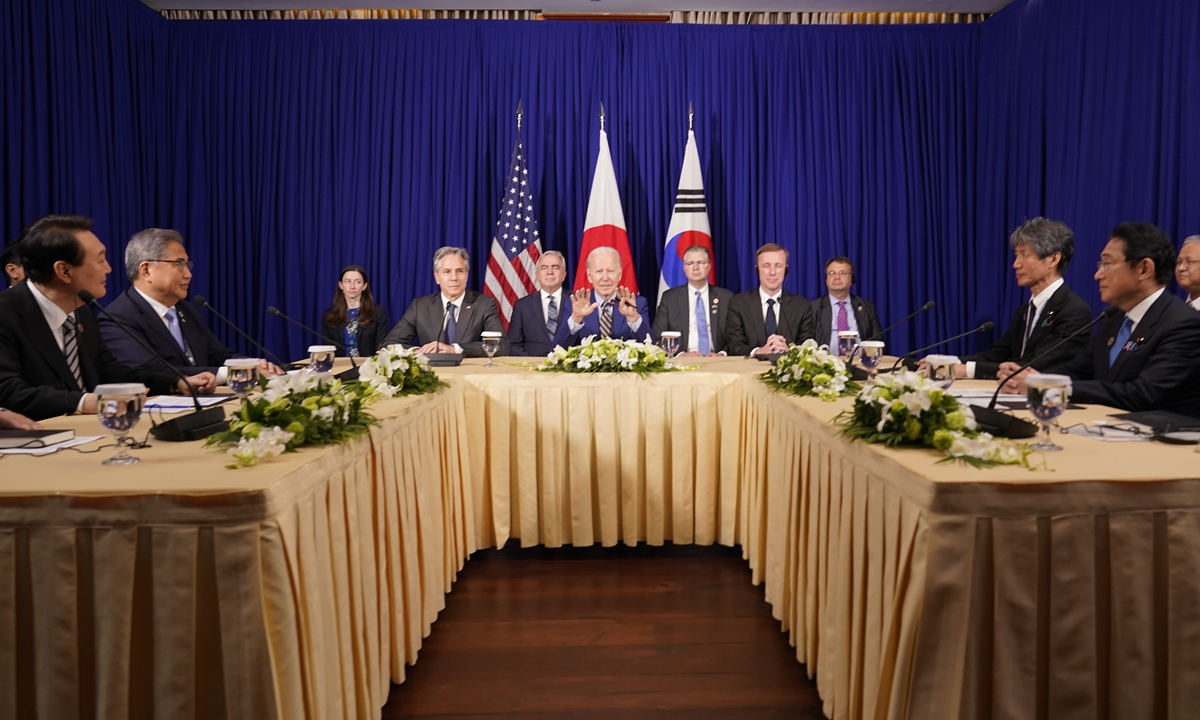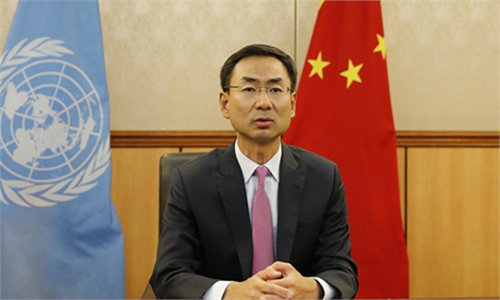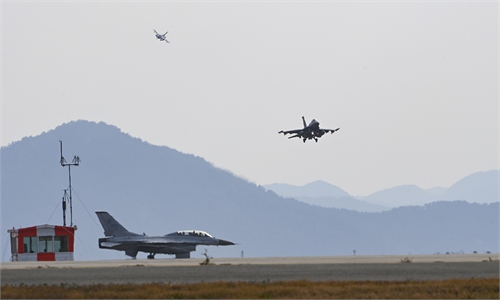US-Japan-S.Korea leaders meeting won't ease situation, but to escalate tensions on Korean Peninsula: experts

US President Joe Biden (center) meets with South Korean President Yoon Suk Yeol (left) and Japanese Prime Minister Fumio Kishida (right) on the sidelines of the Association of Southeast Asian Nations (ASEAN) summit, Sunday, November 13, 2022, in Phnom Penh, Cambodia. Photo: VCG
The leaders of the US, Japan and South Korea met on Sunday to further coordinate their positions on the North Korea missile testing activity on the sidelines of the East Asia Summit in Cambodia, while also seeking input on managing China's influence in the Pacific region. Chinese experts believe that while the US has stepped up efforts in aligning its allies to serve its own strategic purposes, it will only escalate tensions on the Korean Peninsula and there will be growing divergences between Japan and South Korea in terms of confronting China for Washington's interests.
US President Joe Biden said on Sunday that the US, Japan and South Korea were "more aligned than ever" on North Korea, which he added has continued its "provocative behavior," Reuters reported.
Speaking in Cambodia after a trilateral meeting with Japan and South Korea, he called them "critical allies" that share the US' concerns about North Korea's missile tests, the report said.
Biden also met separately with Japanese Prime Minister Fumio Kishida and South Korean President Yoon Suk Yeol on Sunday, before the three leaders met together on the sidelines of the summit. US National Security Adviser Jake Sullivan told reporters on Saturday that Biden aims to use the meetings to strengthen the three countries' joint response to the "dangers posed by North Korea."
The three leaders met last time on the sidelines of the NATO summit in Madrid, Spain in June, where they voiced concerns over North Korea's "escalatory ballistic missiles and tests," saying that the three countries shared an objective, including a complete denuclearization of the Korean Peninsula and a free as well as open Indo-Pacific, media reports said.
Since the last meeting of the trio of world leaders, tensions have continued to escalate in the Korean Peninsula, and the US-South Korea-Japan meeting on Sunday will help them further coordinate a tougher stance toward North Korea, which could also mean increasing pressure on Pyongyang, some Chinese experts said.
"The upcoming measures will further fuel the flames," Yang Xiyu, a senior research fellow at the China Institute of International Studies, told the Global Times on Sunday.
Tensions on the Korean Peninsula situation escalated to fresh heights recently when North Korea reportedly launched multiple missiles after a US-South Korea military drills kicked off. Chinese experts believe that the missile launches are in response to South Korean-US joint deterrence efforts, and that past experience has shown that increasing military deterrence against North Korea only provokes a tougher response from Pyongyang.
Yoon said on Sunday that North Korea's denuclearization is a precondition for peace in the Indo-Pacific region and that his country remains prepared to provide unsparing assistance should the North decide to denuclearize, the Yonhap News Agency reported.
China should remain cautious about the US using the excuse of North Korea nuclear issue to advance military cooperation between South Korea and Japan and realize the US plan for an "Asian NATO," Lü Chao, an expert on the Korean Peninsula at the Liaoning Academy of Social Sciences, told the Global Times on Sunday.
"The true intention is advancing military cooperation to contain China in the region, which will severely affect the stability and peace of Northeast Asia," he said, also calling for vigilance about how far the cooperation between South Korea and Japan could go.
Meanwhile, Japan and South Korea held the first official talks in about three years between their leaders on Sunday in Cambodia, as both countries have shown willingness to improve bilateral ties damaged significantly by wartime labor issues, Kyodo News reported.
However, whether bilateral relations between Japan and South Korea are at a low or a high point, the two countries must serve Washington's strategies in Northeast Asia, the Asia-Pacific and Indo-Pacific regions. When it comes to containing the influence of China, the Biden administration has been seeking to harness its allies to its chariot to compete with China, but there are tangible differences between Japan and South Korea, some experts said.
Unlike Japan, which has the ambition of containing China and aligns with Washington's strategic goals more actively, South Korea is more focused on how to safeguard peace and stability on the Korean Peninsula, Yang noted.
"Also, on the issue of picking a side, it's much more difficult for Seoul. It has to cooperate with China more closely economically, and the role of China is particularly important in the North Korea issue," he said.



